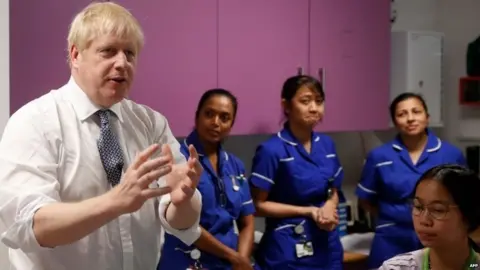General election 2019: Boris Johnson vows to 'forge a new Britain'
The Conservatives will "get Brexit done" and "forge a new Britain", Boris Johnson has said as he launched the party's election manifesto.
He promised 50,000 more nurses in England and the creation of 50 million more GP appointments.
Other pledges include tighter immigration controls and not to increase rates of income tax, national insurance and VAT.
The 59-page manifesto comes 18 days before the general election.
Speaking at its launch in Telford, Shropshire, the prime minister said the choice facing the country in this "closely fought" contest had "never been starker".
"Get Brexit done and we can focus our hearts and minds on the priorities of the British people," he added.
The manifesto, which the PM described as a "partial blueprint" for the future of the country, promises 20,000 more police officers and to "level up" schools funding.
Other policies include:
- A "triple tax lock", ruling out increases in the headline rate of income tax and National Insurance, as well as VAT, for five years
- Raising the National Insurance threshold to £9,500 in 2020, with an ambition to raise it further to £12,500
- Childcare: £250m a year, for at least three years, plus a £250m capital spending boost, for "wraparound" childcare - meaning after school or during holidays
- Environment: £6.3bn for upgrades to homes, such as grants for improving boilers and insulation
- £500m a year for four years for filling potholes - almost 10 times the amount promised by the party in an announcement in March
- A new National Skills Fund of £600m a year for five years. Labour and the Liberal Democrats have announced similar plans
- Building "Northern Powerhouse Rail" between Leeds and Manchester and investing £28.8bn in strategic and local roads
- A review of the "relationship between the government, Parliament and courts"
- There are no plans to repeal the Hunting Act, which bans the hunting of foxes and others wild mammals with dogs in England and Wales.
BBC assistant political editor Norman Smith said it was a pared-back, "take-no-chances" manifesto.
A plan to lift income tax thresholds for middle-earners to £80,000, announced during the Tory leadership campaign, has been dropped, with Mr Johnson saying this "was not the time" for such a move.
Nursing
 AFP
AFPThere is a pledge to increase the number of nurses in the NHS England workforce by 50,000 by 2024-5.
The aim is to train 14,000 new graduates and undergraduates. It is hoped that expanded nurse apprenticeship schemes will bring 5,000 more recruits.
Nursing maintenance grants scrapped in 2017 will be restored. These will fund student living costs up to £8,000 at an estimated cost of £760m in 2020-21, rising to £880m in 2023-4.
A further 12,500 nurses will be recruited from abroad, through a new NHS visa.
Finally, it is hoped that 18,500 nurses will stay in the profession or return to work through because of career development opportunities and an enhanced retention programme.


The Conservatives' target for 50,000 more nurses in England by 2024 is an ambitious one.
Around 19,000, according to the party, will come from extra training places and the incentive of reintroduced maintenance grants for students.
This is something of a U-turn, as it was the Conservative government which scrapped the grants in 2017 after which the number of applicants for nursing degrees fell.
The policy, though, involves retaining tuition fees - before 2017 nursing students did not have to pay these costs.
That leaves more than half the target to come from overseas recruitment and better retention.
The Conservative policy is to cut the cost of visas for foreign health staff but the surcharge to cover their healthcare costs will rise. The outlook for recruitment outside the UK looks uncertain.
The party says there will be more effective retention of existing staff through continuing professional development and there will be measures to encourage nurses who have left the NHS to return to the workforce.
Once again, that sounds fine in principle but achieving it is another matter.

Brexit
The prime minister promised to bring back the Withdrawal Agreement Bill to Parliament before 25 December.
The Conservatives want MPs to ratify the prime minister's Brexit deal before the UK is due to leave the EU on 31 January. After this there would be a "transition period" - during which the UK would continue to follow EU rules while the two sides try to work out a permanent trade deal.
The manifesto rules out extending the transition period beyond the 31 December 2020 deadline.
The House of Commons approved the Withdrawal Agreement Bill in principle in October. But it has to be reintroduced because Parliament was dissolved ahead of the election on 12 December.


The Conservatives promise to negotiate a trade deal with the EU next year, and have confirmed as a written manifesto pledge that they will not extend the post-Brexit transition period beyond December 2020.
That is an incredibly short amount of time to finalise a trade deal of any significant ambition, and it means the EU knows in advance what the UK's negotiating deadlines are.
The Conservatives say the UK will be outside the EU single market, and any form of customs union.
There will be no political alignment with the EU, the manifesto says, and it promises that the UK will be in full control of its fishing waters.
But until we know the terms of a new relationship with the EU, business uncertainty will continue.
And it will be hard to argue that Brexit has really been done.

Hospital parking
The manifesto promises free hospital parking in England for people with disabilities, frequent patients, the gravely ill, families of long-stay patients, carers and NHS staff working night shifts.
The Conservative Party says £78m per year will be provided, which it claims is new funding for extra parking capacity, or compensation for lost fees. Labour wants to make hospital parking free for everyone in England, in line with Wales and Scotland.
'Care consensus'
The manifesto promises £1bn per year in extra funding for care for the elderly over the next five years.
The PM said he was willing to talk to other parties to come up with a long-term solution for funding the system.
Universal benefits
The "triple lock" on the UK state pension - meaning it will rise by the rate of average earnings, inflation or 2.5%, whichever is higher - will be retained as will the older person's free bus pass.
The government says free TV licences for all over-75s should be maintained. The BBC - which is now responsible for administering them - has said only those on pension credit will get them free in the future.
How will it be paid for?
Despite their big spending commitments, the Conservatives say they are committed to fiscal discipline and all their proposals are costed.
An accompanying document - setting out how the plans will be paid for - says there will be no borrowing to pay for day-to-day spending and the budget will remain in balance.
Paul Johnson, director of the Institute for Fiscal Studies think tank, said the party's pledge not to raise taxes could "come back to bite" it, as it could limit the ability to deal with costs to the NHS from an ageing society.
And Labour leader Jeremy Corbyn said the manifesto was "paid for by billionaires, written by billionaires and delivered by billionaires - the problem is the rest of us will end up paying for it".


What are the parties promising you?
Here's a concise guide to where the parties stand on key issues like Brexit, education and the NHS.

What are other parties pledging on Brexit, taxes and childcare?
Brexit: Labour is promising to negotiate a new Brexit deal within three months, based on close alignment with the EU. This would then be put to the public in a legally binding referendum, alongside the option of staying in the EU.
The Liberal Democrats have vowed to cancel Brexit if elected as a majority government, or otherwise campaign for a referendum with the option of staying in the EU.
The SNP wants Scotland to stay in the EU and the Brexit Party says the UK should leave immediately without an exit deal, but negotiate a free trade agreement with the EU.
Taxes: Labour has set out plans to raise income tax for the top 5% of earners and reverse cuts to corporation tax in order to increase public spending.
The Liberal Democrats would bring in a 1p rise in income tax to spend on health and social care.
The Brexit Party wants to scrap corporation tax for companies earning less than £10,000 a year, ditch VAT for fuel bills and abolish inheritance tax.
Childcare: Labour has pledged that within five years two, three and four-year-olds will be entitled to 30 hours of free pre-school education per week.
The Lib Dems are offering to fund 35 hours of childcare, 48 weeks a year for children aged two to four.


Do you have any questions about the election?
In some cases your question will be published, displaying your name and location as you provide it, unless you state otherwise. Your contact details will never be published. Please ensure you have read the terms and conditions.
Use this form to ask your question:
If you are reading this page and can't see the form you will need to visit the mobile version of the BBC website to submit your question or send them via email to YourQuestions@bbc.co.uk. Please include your name, age and location with any question you send in.
